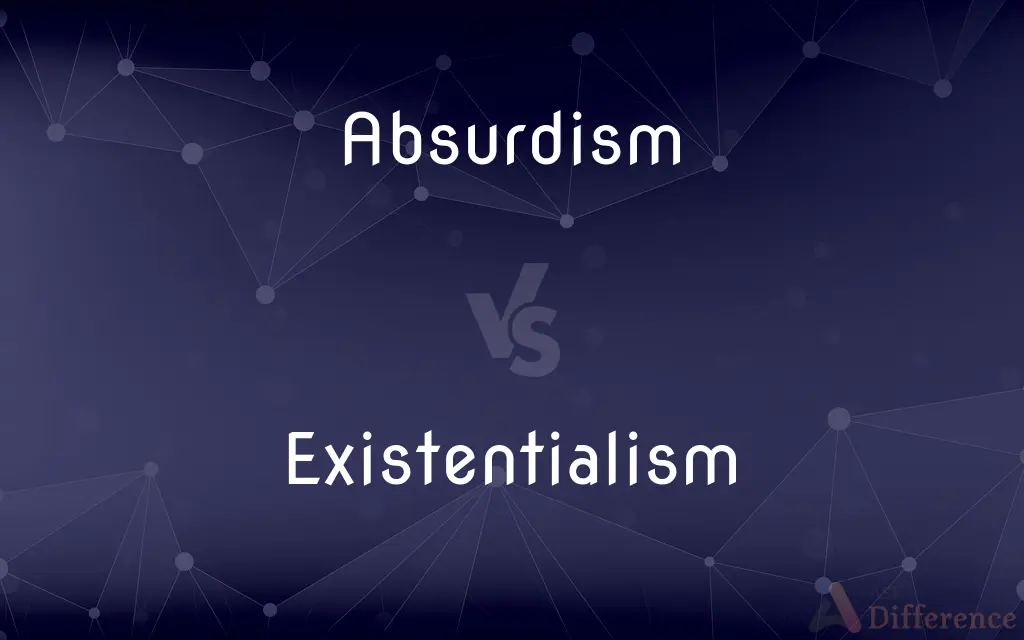Absurdism vs. Existentialism — What's the Difference?
By Tayyaba Rehman — Updated on November 3, 2023
Absurdism posits that life is inherently meaningless and humans cannot find true purpose, while Existentialism suggests life has no inherent meaning but humans can create it.

Difference Between Absurdism and Existentialism
Table of Contents
ADVERTISEMENT
Key Differences
Absurdism is a philosophy asserting that human beings exist in a purposeless, chaotic universe. Existentialism, while also grappling with the meaninglessness of existence, posits that individuals can impart their own meaning and essence to life.
Absurdist philosophy argues that the search for meaning may lead to a confrontation with the absurd, the conflict between the human tendency to seek inherent value and the silent, indifferent universe. Existentialists accept the lack of inherent meaning but focus on the capacity for self-definition and self-creation.
Absurdism holds that the effort to find meaning is ultimately futile, leading to a recognition of absurdity. In contrast, Existentialism encourages taking personal responsibility for creating meaning, despite the indifferent nature of the universe.
The notion of the 'absurd' in Absurdism comes from this conflict and is central to the philosophy. Existentialism centers around the concept of 'existence precedes essence,' meaning that individuals define their own existence through actions, decisions, and experiences.
Comparison Chart
View on Meaning
Believes life is inherently meaningless.
Argues life has no inherent meaning but we can create it.
ADVERTISEMENT
Human Purpose
Sees the quest for purpose as absurd.
Believes in creating one’s own purpose.
Universe's Nature
Views the universe as indifferent and chaotic.
Sees the universe as lacking inherent values, not necessarily chaotic.
Response to Absurdity
Acceptance of the absurd and embracing it.
Creation of personal values and meaning despite absurdity.
Philosophical Proposition
Human efforts to find meaning will always fail.
Humans have freedom to define their lives.
Compare with Definitions
Absurdism
Recognition of the conflict between human search for meaning and an unresponsive universe.
The theater of the absurd represents Absurdism by abandoning logical plots.
Existentialism
The doctrine that existence precedes essence.
The protagonist’s journey in the novel is an ode to Existentialism.
Absurdism
Philosophy that humans live in purposeless chaos.
Absurdism resonates in Kafka's work, highlighting the irrationality of life.
Existentialism
Belief that individuals are free and responsible for their own development.
In Existentialism, he found the impetus to change his career path.
Absurdism
The belief in the inherent absurdity of existence.
Camus's The Stranger is often cited to explain Absurdism.
Existentialism
A philosophy centering on individual existence, freedom, and choice.
Sartre's writings often illustrate the tenets of Existentialism.
Absurdism
Acceptance that the quest for universal truth is futile.
His latest novel embodies Absurdism by refusing to provide closure.
Existentialism
The philosophical theory that stresses personal authenticity.
Her life choices reflected Existentialism's value on personal authenticity.
Absurdism
The embrace of the absurd as a foundation of philosophical thought.
Her artwork reflects Absurdism in its embrace of illogical scenarios.
Existentialism
Emphasis on the isolated individual experiencing a hostile or indifferent universe.
The play's focus on choice in a senseless world echoes Existentialism.
Absurdism
In philosophy, "the Absurd" refers to the conflict between the human tendency to seek inherent value and meaning in life, and the human inability to find these with any certainty. The universe and the human mind do not each separately cause the Absurd; rather, the Absurd arises by the contradictory nature of the two existing simultaneously.
Existentialism
Existentialism ( or ) is a form of philosophical inquiry that explores the problem of human existence and centers on the experience of thinking, feeling, and acting. In the view of the existentialist, the individual's starting point has been called "the existential angst," a sense of dread, disorientation, confusion, or anxiety in the face of an apparently meaningless or absurd world.
Absurdism
A philosophy, often translated into art forms, holding that humans exist in a meaningless, irrational universe and that any search for order by them will bring them into direct conflict with this universe
"True absurdism is not less but more real than reality" (John Simon).
Existentialism
A philosophy that emphasizes the uniqueness and isolation of the individual experience in a hostile or indifferent universe, regards human existence as unexplainable, and stresses freedom of choice and responsibility for the consequences of one's acts.
Absurdism
An act or instance of the ridiculous
"This strained conceit never quite locates screen equivalents for the stage absurdisms" (Village Voice).
Existentialism
A twentieth-century philosophical movement emphasizing the uniqueness of each human existence in freely making its self-defining choices.
The heyday of existentialism occurred in the mid-twentieth century.
Absurdism
A philosophy which holds that the universe is chaotic and irrational and that any attempt to impose order will ultimately fail.
Existentialism
The philosophical views of a particular thinker associated with the existentialist movement.
Sartre's existentialism is atheistic, but the existentialism of Marcel is distinctly Christian.
Absurdism
(countable) Absurdity, something that is absurd
Existentialism
A philosophical theory or attitude having various interpretations, generally emphasising the existence of the individual as a unique agent with free will and responsibility for his or her own acts, though living in a universe devoid of any certain knowledge of right and wrong; from one's plight as a free agent with uncertain guidelines may arise feelings of anguish. Existentialism is concerned more with concrete existence rather than abstract theories of essences; is contrasted with rationalism and empiricism; and is associated with Kierkegaard, Heidegger and Sartre, as well as others.
Existentialism
(philosophy) a 20th-century philosophical movement; assumes that people are entirely free and thus responsible for what they make of themselves
Common Curiosities
What is Existentialism?
Existentialism is a philosophical theory that emphasizes individual existence, freedom, and the ability to give one's own meaning to life through choices and actions.
Can Absurdism and Existentialism be reconciled?
While both acknowledge the lack of inherent meaning in life, they diverge on how to respond to this realization, making them distinct philosophies.
Does Absurdism see any value in life?
Absurdism sees life as inherently meaningless, though individuals can still live with and embrace the absurd.
Who are some notable Absurdist philosophers?
Albert Camus is often associated with Absurdism, especially with his essay "The Myth of Sisyphus."
Who are some notable Existentialist philosophers?
Jean-Paul Sartre and Simone de Beauvoir are renowned Existentialist philosophers.
How does Absurdism impact people's view of the world?
It can lead to a sense of disillusionment but also to a liberated acceptance of life's unpredictability.
Is freedom a central theme in Existentialism?
Yes, freedom and the responsibility that comes with it are central to Existentialist thought.
Is Existentialism religious or atheistic?
Existentialism can be both; it doesn't prescribe a particular stance on religion and includes both theistic and atheistic thinkers.
What is Absurdism?
Absurdism is a philosophy that stresses the conflict between human tendencies to seek inherent value in life and the inability to find any in a chaotic, indifferent universe.
Does Existentialism view life as without purpose?
Existentialism sees life as initially purposeless but believes individuals can create their own meaning and purpose.
Do Absurdism and Existentialism prescribe a way to live?
Absurdism suggests embracing the absurd, while Existentialism emphasizes creating one’s own path through authentic choices.
Can Absurdism be optimistic?
While it might seem pessimistic, some interpret Absurdism as a call to embrace life fully, despite its inherent absurdity.
Can one live an Absurdist life?
Yes, by recognizing the absurdity of life and continuing to search for meaning in spite of it.
Is angst associated with Existentialism?
Angst is often discussed in Existentialism as the feeling of dread or anxiety stemming from the realization of one's true freedom.
Are Absurdism and Existentialism still relevant?
Yes, they continue to influence contemporary philosophy, literature, and cultural discourse.
Share Your Discovery

Previous Comparison
Statics vs. Statistics
Next Comparison
Contractor vs. VendorAuthor Spotlight
Written by
Tayyaba RehmanTayyaba Rehman is a distinguished writer, currently serving as a primary contributor to askdifference.com. As a researcher in semantics and etymology, Tayyaba's passion for the complexity of languages and their distinctions has found a perfect home on the platform. Tayyaba delves into the intricacies of language, distinguishing between commonly confused words and phrases, thereby providing clarity for readers worldwide.













































